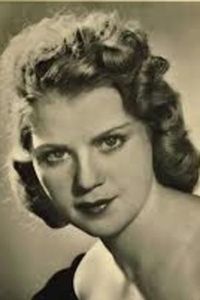Kristina Söderbaum was born on October 5, 1912, in Stockholm, Sweden, to a professor from Djursholm, a prestigious neighborhood in Stockholm. After completing her education, she traveled to Paris to hone her French language skills, and it was during this time that she unexpectedly landed a role in the short film "Hur behandlar du din hund?" in 1934.
In 1935, Söderbaum moved to Berlin, where she pursued a degree in the history of art while also taking acting classes. It was during this period that she met her future husband, Veit Harlan, with whom she would go on to collaborate on numerous film projects.
During World War II, Söderbaum played leading roles in several popular Nazi propaganda films under the direction of her husband, Veit Harlan. Between 1939 and 1945, they produced a string of successful films, including "Covered Tracks" (1938),"The Immortal Heart" (1939),"The Trip to Tilsit" (1939),"Die goldene Stadt" (1942),"Immensee" (1943),"Opfergang" (1944),and "Burning Hearts" (1945). One of the most infamous films produced during this period was "Jud Süß" (1940),a strongly antisemitic propaganda film.
Three years after the release of "Jud Süss," Söderbaum was awarded an honorary student degree from Uppsala University in Sweden. However, she later expressed regret over her involvement in these films and never attempted to revive her acting career.
Instead, she continued to work in the film industry, primarily in the capacity of a fashion photographer in Munich, Germany, and appeared in occasional television productions until the 1990s. After her husband's death in 1964, Söderbaum wrote her memoirs, "Nichts bleibt immer so," which were published in 1983.
Kristina Söderbaum passed away on February 12, 2001, in Hitzacker, Lower Saxony, Germany.












